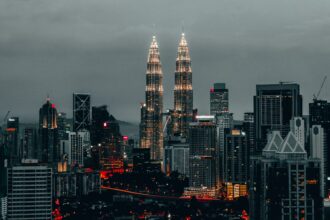I had a chance to visit Malaysia recently. The parliamentary elections took place on the day of my arrival. Election day and the day after are public holidays. This may be related to the mass riots that broke out the day after the Chinese People’s Party (DAP) won the 1969 general election, which resulted in the death of over 600 people,mostly Chinese.
According to the 2019 statistics, the demographics of Malaysia is made up of 62 percent Malay, 20.6 percent Chinese, 6.2 percent Indian, 1 percent other ethnicities, as well as 10 percent non-Malaysian residents. Despite wanting to write a lot about this country of 33.3 million people with a GDP of 373 billion dollars, a per capita income of 10,800 dollars, which is the 34th largest economy in the world and the most diversified economy in Asia with a modern infrastructure, I have decided to focus on three topics related to Mongolia: their present corruption, elections, and rehabilitation of former mining sites.
Corruption
On August 23, 2022, the Malaysian Court of Appeal upheld the 12-year prison sentence for the crimes of corruption of Najib Razak, the former prime minister of nine years. In the span of four years, this man embezzled 4.5 billion dollars from his country’s development fund (1MDB). The court found that he laundered money through commercial banks in various countries, had Hollywood make a film for him, and bought expensive hotels, ships, and jewelry. His wife, Rozmah Mansor, was sentenced to 10 years in prison and fined 250 million dollars for accepting bribery in favor of influencing state bidding. During a search of their home, $1.6 million worth of gold and diamond rings and necklaces, as well as 272 Hermes bags, were found. Their judiciary made fair judgments under the pressure of the opposition.
The family of N. Razak is related to the death of a Mongolian citizen. At the time he was serving as the Minister of Defense, a submarine was purchased from France, during which his advisor A.R. Baginda hired Sh. Altantuya as an interpreter. This woman was murdered in 2006, in a forest not far from Kuala Lumpur, which is explained to be linked to her having been being a witness of corruption. SCMP reported that Malaysian courts have spent 15 years without a final answer to the question of who is responsible for ordering the brutal killing. However, this criminal case has been brought up from time to time for political purposes.
Anyone commiting crime or embezzling public funds through their high government position must be held accountable. How about holding the perpetrators and high government officials accountable for the cases related to the DB, coal theft, and Suruga company? Mongolian citizens doubt the justice of the judiciary nowadays. Is it possible that those crimes remain unsolved, dragging out the process until the elections, only to be forgotten when the government is established? Will the thieves continue to live happily ever after and those working hard continue to remain impoverished?
Elections
On October 10, 2022, the Malaysian PM Ismail Yaakob dissolved the Parliament and held a general election on November 18, 2022. The Malaysian Parliament has a House of Representatives with 222 seats and a Senate with 70 seats (Westminster system). With a voter turnout of 73 percent, the PK party won 82 seats, the PN party won 73 seats, and the coalition of ruling BN and UMNO parties won only 30 seats out of 222 seats. The king solved the dispute on the question of who would become the prime minister to form a government and, appointed Anwar Ibrahim of the PK party as the prime minister. Anwar, who had been striving to reach this position for 24 years, declined his expensive Mercedes S600 which costs more than his salary. He promised to reduce the number of ministers and their salaries.
Anwar is one of many PMs in the last four years and will face the tough task of dragging the country out of economic difficulties and price increase caused by the pandemic.Moreover, he will have to work with an opposition that does not provide strong political support to him and may remove him from office any day.
Rehabilitation
I stayed at Sunway Pyramid Hotel in Sunway City, Selangor, southwest of Kuala Lumpur. It is a major international district of tourism, recreation, health, and education. The hotel has 10 floors below the street level and 20 floors above. Behind the hotel, what used to be an open pit crater was now a huge water park, offering incredible recreational facilities for all ages, from artificial tide surfing pool to twisting and sliding tubes, etc. The university and college of this town are internationally acclaimed, and its graduates find jobs the fastest.

Sunway City is the fruit of the government’s consistent effort and policy to rehabilitate the century-old tin mine and build an effective public-private partnership. The Malaysian government has been very cautious to not only rehabilitatethe used deposits, but to also enable a productive and income-generating enterprise, and has supported them through tax exemption for a certain period. There are many stories of abandoned mines being transformed into tourist attractions: former coal mine of Kuantan Beach, The Mines, The Clearwater Sanctuary Golf resort, and Lake Titiwangsa, to name a few. For the government, this sort of involvement in projects likes these, is the wisest choice.
In our country, with mining booming, we currently focus on rehabilitating the used deposits and turning them back to their natural state. However, I have realized that we should plan early on to develop in those areas, artificial lakes, resorts, and tourism and cultural facilities for future generations, and facilitate the process of giving such freedom and opportunity to the private sector.
From the Malaysian example, we Mongolians and any other country, have many lessons and warnings at the same time. A 2016 article “Sky Bridge” about Malaysia can be read here.
Kuala Lumpur. November, 2022
Trans. by Riya.T and Munkh-Erdene.D












